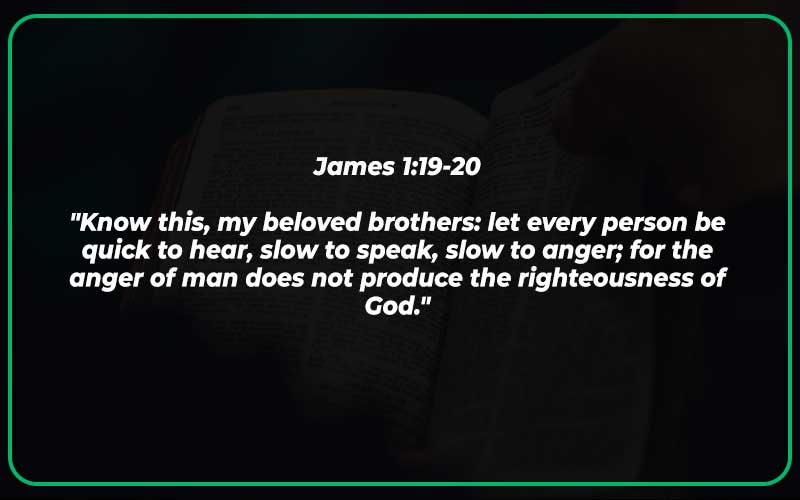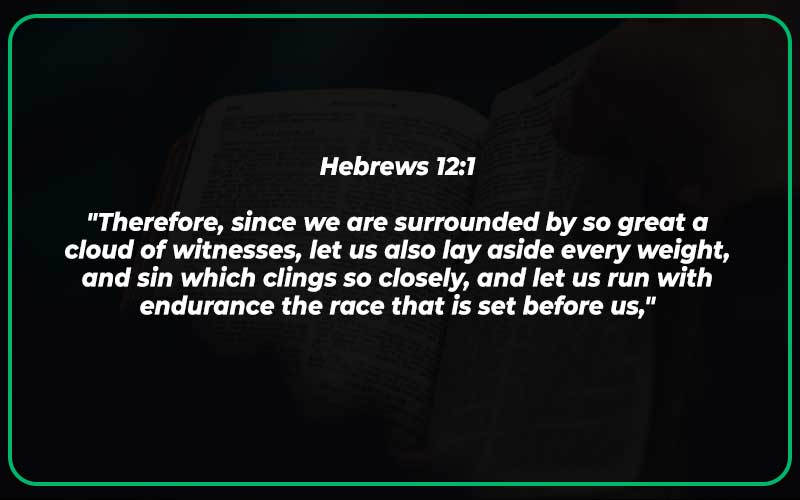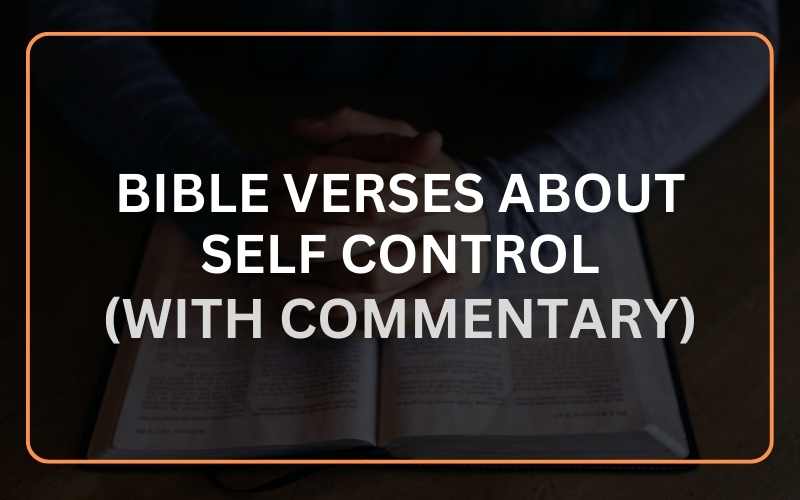Self-control is a virtue that enables us to govern our actions, emotions, and desires. The Bible offers wisdom and encouragement in developing self-control as we seek to live a life aligned with God’s will.
In this blog post, we will explore a selection of Bible verses that illuminate the importance of self-control, offer practical guidance, and inspire us to cultivate discipline in every area of our lives.
Also Read: Bible Verses About Loving Others
Bible Verses About Self Control
Proverbs 25:28
“A man without self-control is like a city broken into and left without walls.”
This verse emphasizes the importance of self-control in guarding against destruction and chaos. Without self-control, one’s life can become vulnerable to sin and harmful behavior.
1 Corinthians 9:27
“But I discipline my body and keep it under control, lest after preaching to others I myself should be disqualified.”
The Apostle Paul speaks about the need for self-discipline and self-control in his spiritual journey. He recognizes that failing to control his own body’s desires can lead to disqualification from preaching the Gospel.
Galatians 5:22-23
“But the fruit of the Spirit is love, joy, peace, patience, kindness, goodness, faithfulness, gentleness, self-control; against such things there is no law.”
This verse lists self-control as one of the fruits of the Holy Spirit, highlighting its importance in living a life aligned with God’s will. It’s a reminder that self-control is not just a personal attribute but a supernatural gift from God.
2 Timothy 1:7
“For God gave us a spirit not of fear but of power and love and self-control.”
This verse speaks to the source of self-control—God. It assures believers that they have been given a spirit of power, love, and self-control, enabling them to overcome fear and live in obedience to God.
Titus 2:11-12
“For the grace of God has appeared, bringing salvation for all people, training us to renounce ungodliness and worldly passions, and to live self-controlled, upright, and godly lives in the present age.”
This verse reminds believers that self-control is not just a personal virtue but a response to God’s grace. It challenges believers to renounce worldly passions and live in a way that reflects God’s character.
James 1:19-20
“Know this, my beloved brothers: let every person be quick to hear, slow to speak, slow to anger; for the anger of man does not produce the righteousness of God.”
This verse encourages self-control in the area of communication, urging believers to listen more than they speak, and to exercise patience in the face of anger. It reminds us that being slow to anger and quick to listen is a hallmark of righteousness.

1 Peter 1:13
“Therefore, preparing your minds for action, and being sober-minded, set your hope fully on the grace that will be brought to you at the revelation of Jesus Christ.”
This verse emphasizes the need for self-control in our thought lives. We must be alert and clear-headed, avoiding the distractions that can pull us away from living a life fully surrendered to Christ.
2 Peter 1:5-7
“For this very reason, make every effort to supplement your faith with virtue, and virtue with knowledge, and knowledge with self-control, and self-control with steadfastness, and steadfastness with godliness, and godliness with brotherly affection, and brotherly affection with love.”
This verse lists self-control as part of a progression of virtues that Christians should seek to cultivate in their lives. It reminds believers that developing self-control is a vital part of living a godly life that reflects Christ’s character.
James 3:2
“For we all stumble in many ways. And if anyone does not stumble in what he says, he is a perfect man, able also to bridle his whole body.”
This verse acknowledges that self-control can be difficult to maintain but emphasizes its importance in living a godly life. It reminds us that even small victories in self-control can have a significant impact on our spiritual growth.
Proverbs 16:32
“Whoever is slow to anger is better than the mighty, and he who rules his spirit than he who takes a city.”
This verse emphasizes the power of self-control, particularly in the areas of anger and emotion. It suggests that a person who can control their own emotions is more powerful than even the mightiest conqueror.
1 Timothy 4:7
“Have nothing to do with irreverent, silly myths. Rather train yourself for godliness;”
This verse highlights the importance of training oneself for godliness, and self-control is a key part of that training. It encourages us to let go of worldly distractions and focus on cultivating the virtues that bring us closer to God.
Proverbs 15:18
“A hot-tempered man stirs up strife, but he who is slow to anger quiets contention.”
This verse highlights the negative impact that a lack of self-control can have on our relationships with others. It reminds us that being slow to anger and exercising self-control can have a calming effect on conflict and strife.
Ecclesiastes 7:9
“Be not quick in your spirit to become angry, for anger lodges in the bosom of fools.”
This verse warns against the danger of uncontrolled anger and emphasizes the importance of self-control in managing our emotions. It reminds us that rash decisions made in the heat of anger can have negative consequences that could have been avoided with self-discipline.
Proverbs 10:19
“When words are many, transgression is not lacking, but whoever restrains his lips is prudent.”
This verse encourages restraint in communication, emphasizing the importance of self-control in managing our speech. It reminds us that wise communication requires not just good words but also the discipline to hold back when necessary.
Galatians 5:16
“But I say, walk by the Spirit, and you will not gratify the desires of the flesh.”
This verse highlights the connection between self-control and the Holy Spirit. It reminds us that relying on God’s power to help us overcome our fleshly desires is key to exercising self-control in our lives.
James 4:7
“Submit yourselves therefore to God. Resist the devil, and he will flee from you.”
This verse speaks to the importance of submitting our lives to God and resisting the temptations of the devil. It reminds us that exercising self-control is not just a personal discipline but a spiritual one, rooted in our relationship with God.
Colossians 3:5
“Put to death therefore what is earthly in you: sexual immorality, impurity, passion, evil desire, and covetousness, which is idolatry.”
This verse calls believers to put to death the sinful desires of our flesh and instead pursue the virtues that reflect God’s character. It emphasizes that self-control in areas like sexual morality and greed is a vital part of living a godly life.
2 Corinthians 7:1
“Since we have these promises, beloved, let us cleanse ourselves from every defilement of body and spirit, bringing holiness to completion in the fear of God.”
This verse highlights the importance of purifying ourselves from all that defiles, both physically and spiritually. It encourages believers to exercise self-control in all areas of life, knowing that it is essential for pursuing holiness and pleasing God.
Proverbs 14:29
“Whoever is slow to anger has great understanding, but he who has a hasty temper exalts folly.”
This verse speaks to the wisdom of self-control, particularly in the area of managing our emotions. It reminds us that being slow to anger requires not just self-discipline but also a deep understanding of others and ourselves.
Hebrews 12:1
“Therefore, since we are surrounded by so great a cloud of witnesses, let us also lay aside every weight, and sin which clings so closely, and let us run with endurance the race that is set before us,”
This verse encourages believers to lay aside anything that might hinder our pursuit of Christlikeness, including sin and other distractions. It emphasizes the perseverance and self-control required to run the race set before us.

What does the Bible say About Self Control?
The Bible places great emphasis on self-control, also known as self-discipline or temperance. Throughout its teachings, both in the Old and New Testaments, the concept of self-control is highlighted as a virtue that is essential for living a righteous and godly life.
Self-control involves the ability to restrain one’s impulses, desires, and emotions, leading to responsible and disciplined behavior. It is seen as a means of avoiding sin, making wise decisions, and maintaining a balanced and virtuous life.
Several passages in the Bible explicitly mention self-control and its significance. For instance, Proverbs 25:28 states, “A man without self-control is like a city broken into and left without walls.” This comparison indicates that lacking self-control leaves one vulnerable to destructive forces.
In the New Testament, the Apostle Paul often emphasized self-control in his writings. Galatians 5:22-23 includes self-control as one of the fruits of the Holy Spirit, suggesting that it is a characteristic that should manifest in the life of a believer guided by the Spirit.
Moreover, 2 Timothy 1:7 states, “For God gave us a spirit not of fear but of power and love and self-control.” Here, self-control is associated with power and love, indicating that exercising self-control allows individuals to act in ways that align with God’s principles and exhibit love towards others.
The Bible also warns against the dangers of lacking self-control. Proverbs 16:32 declares, “Whoever is slow to anger is better than the mighty, and he who rules his spirit than he who takes a city.” This verse underscores the strength that comes from mastering one’s emotions through self-control.
Overall, the Bible portrays self-control as a virtue that enables individuals to live purposefully, avoid sin, and maintain healthy relationships with others. It is seen as a gift from God, strengthened through reliance on the Holy Spirit, and essential for living a righteous and godly life.

